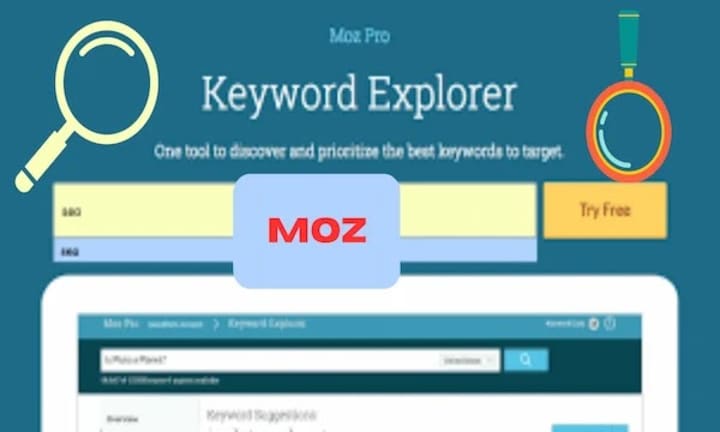How to Find the Best Keyword: Try These 6 Best Free Keyword Research Tools
Keywords are essential for any website or blog to rank on search engines

Introduction
If you want to drive organic traffic to your website, you need to focus on SEO (Search Engine Optimization). Keyword research is a vital aspect of SEO, and it involves finding the right keywords that people use to search for products or services related to your website or blog.
Keyword research helps you understand your target audience and what they are looking for on the internet.
In this article, we will discuss the six best free keyword research tools and how to use them effectively to find the best keywords for your website or blog.
Importance of Keyword Research
Keyword research is essential for the success of your website or blog. It helps you understand what your audience is looking for, and you can create content that addresses their needs.
Keyword research also helps you identify high-traffic keywords, which you can use to optimize your content and improve your website's search engine rankings.
By using the right keywords, you can attract more traffic to your website, increase conversions, and grow your business.
Types of Keywords
There are different types of keywords, and you need to understand them to create a successful SEO strategy.
- Short-Tail Keywords
Short-tail keywords are phrases that are one or two words long, such as "shoes" or "digital marketing." These keywords have high search volumes, but they are also highly competitive.
- Long-Tail Keywords
Long-tail keywords are more specific phrases that are three or more words long, such as "best running shoes for women" or "digital marketing agency in New York." These keywords have lower search volumes but are less competitive.
- LSI Keywords
LSI (Latent Semantic Indexing) keywords are related to the primary keyword and help search engines understand the context of your content. For example, if your primary keyword is "digital marketing," LSI keywords could be "SEO," "content marketing," or "social media marketing."
How to Choose the Right Keyword Research Tool
There are many keyword research tools available, but not all of them are suitable for your needs. When choosing a keyword research tool, consider the following factors:
- Features
Different keyword research tools have different features. Some tools offer more comprehensive keyword data, while others provide keyword suggestions or competitor analysis. Choose a tool that has the features you need.
- User Interface
The user interface of the tool should be intuitive and easy to use. A complicated interface can make the keyword research process difficult and time-consuming.
- Pricing
Some keyword research tools are free, while others require a monthly or yearly subscription. Consider your budget and choose a tool that offers good value for money.
Best Free Keyword Research Tools
Now that we have discussed the importance of keyword research and how to choose the right keyword research tool, let's explore the five best free keyword research tools.
1. Google Keyword Planner

Google AdWords is designed to help advertisers find the right keywords to target for their campaigns
Google Keyword Planner is a free tool provided by Google AdWords. It is designed to help advertisers find the right keywords to target for their campaigns.
However, it is also a great tool for SEO keyword research. Google Keyword Planner provides data on keyword search volume, competition, and suggested bids for paid search ads. You can also use this tool to find new keyword ideas and analyze the performance of your existing keywords.
With Google Keyword Planner, you can see the search volume, competition, and estimated cost per click (CPC) for each keyword. You can also get ideas for new keywords based on your existing keywords or website URL. You can access Google Keyword Planner by signing up for a free Google Ads account.
2. Ubersuggest

It provides keyword suggestions based on search volume.
Ubersuggest is a free keyword research tool created by Neil Patel. It provides keyword suggestions based on search volume, CPC (Cost Per Click), and competition data.
Ubersuggest also provides information on related keywords, content ideas, and backlink data. You can use this tool to generate new keyword ideas and analyze your competitors' keywords. It also offers a feature to analyze your competitors' top-performing pages, which can help you discover new keyword opportunities.
Ubersuggest is easy to use, and you can get started with the tool without creating an account.
3. Answer the Public

A tool that provides keyword suggestions in the form of questions and prepositions
Answer the Public is a free keyword research tool that provides keyword suggestions in the form of questions and prepositions.
It helps you understand what people are searching for by providing insights into their search queries. Answer the Public provides visual representations of keyword data, making it easy to understand and use.
AnswerThePublic is a useful tool for content creators who want to create content that addresses their audience's questions.
4. Keyword Tool
Keyword Tool is a free keyword research tool that provides keyword suggestions for Google, YouTube, Bing, Amazon, and other search engines.
It provides data on keyword search volume, CPC, and competition. Keyword Tool also provides information on long-tail keywords and related keywords. You can use this tool to generate new keyword ideas and analyze your competitors' keywords.
Keyword Tool also offers a paid version that provides more detailed data, but the free version is still a useful tool for keyword research.
5. Moz Keyword Explorer

free keyword research tool that provides data on keyword difficulty, search volume, and potential traffic
Moz Keyword Explorer is a free keyword research tool that provides data on keyword difficulty, search volume, and potential traffic. It also provides information on related keywords and SERP (Search Engine Results Page) features.
Moz Keyword Explorer has a user-friendly interface and provides actionable insights that can help you improve your SEO strategy. You can use this tool to find new keyword opportunities and optimize your existing keywords.
6. Chat GPT
ChatGPT can help generate relevant long-tail keywords. Long-tail keywords are specific phrases that people search for and are easier to rank for compared to broader, more general terms.
You can then use these keywords in your blog post to increase its relevance and improve your chances of ranking in search engine results pages.
Moreover, GPT can help analyze the intent behind search queries. Understanding the intent behind a keyword is essential for creating content that meets the searcher's needs. GPT can analyze search queries and determine whether the user is looking for information, products, or services.
GPT can also help you optimize your content for voice search. With the rise of voice assistants such as Siri and Alexa, optimizing your content for voice search is becoming increasingly important.
By optimizing your content for voice search, you can improve your chances of ranking for voice search queries and capture more traffic to your blog.
Tips for Effective Keyword Research
Here are some tips for effective keyword research:
- Understand your target audience and their search behavior.
- Use a variety of keyword research tools to get comprehensive data.
- Focus on long-tail keywords to target a specific audience.
- Analyze your competitors' keywords and find new keyword opportunities.
- Use LSI keywords to provide context and improve content relevancy.
- Monitor your keyword performance regularly and adjust your strategy accordingly.
Conclusion
Keyword research is an essential aspect of SEO, and it requires careful consideration and analysis. By using the right keyword research tools and following best practices, you can find the best keywords for your website or blog and improve your search engine rankings.
Google Keyword Planner, Ubersuggest, Answer the Public, Keyword Tool, ChatGPT, and Moz Keyword Explorer are some of the best free keyword research tools available. Use them to generate new keyword ideas, analyze your competitors, and optimize your content for SEO.
Similar Articles
Mastering Writing with AI: 12 Essential Tools for Enhanced Productivity
About the Creator
Ahmed Bahaa Eldin Mohamed
Get Ready for the Smart Revolution with Technology for Smart Sphere's Expert Analysis. You will know all about the latest Insights on Smart Technology






Comments
There are no comments for this story
Be the first to respond and start the conversation.